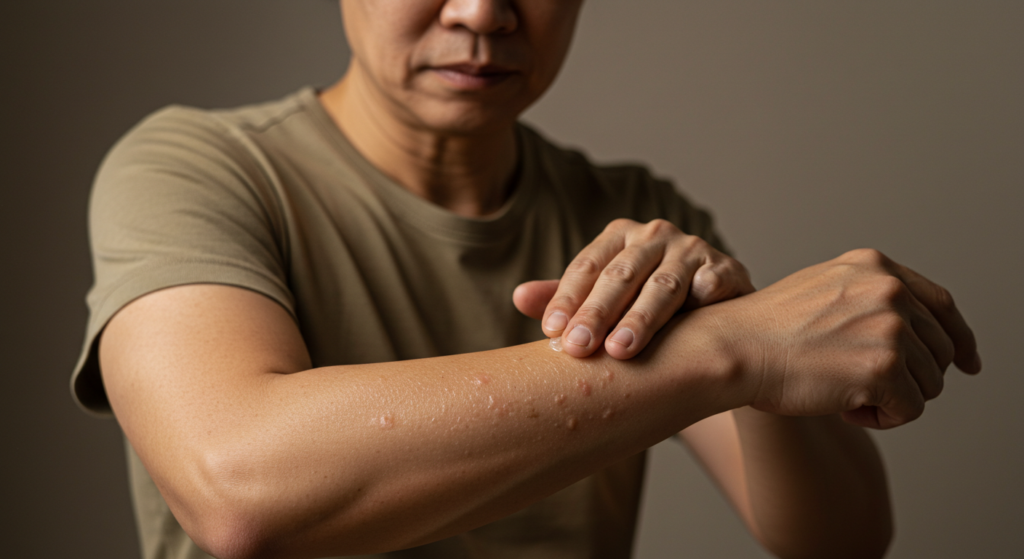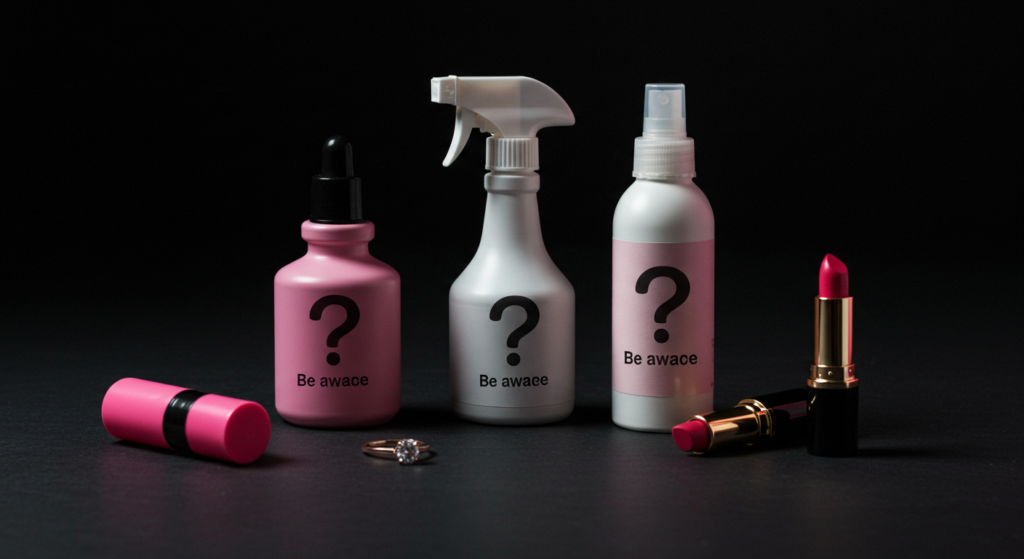La urticaria crónica, también conocida como ronchas crónicas, es una afección debilitante que se caracteriza por ronchas persistentes (ronchas) y picazón que dura seis semanas o más. Esta afección afecta significativamente la calidad de vida, afectando el sueño, la productividad laboral y el bienestar general. Este artículo ofrece una visión general de la urticaria crónica, centrándose en comprender la afección, identificar los desencadenantes, controlar los síntomas y desarrollar estrategias de afrontamiento a largo plazo.

Entendiendo la urticaria crónica
La urticaria crónica es una afección compleja con diversas causas potenciales. En muchos casos, la causa subyacente se desconoce (idiopática), lo que dificulta el diagnóstico y el tratamiento. Sin embargo, se sabe que el sistema inmunitario desempeña un papel fundamental, ya que los mastocitos liberan histamina y otros mediadores inflamatorios que causan la urticaria y el prurito característicos. Estas reacciones pueden ocurrir espontáneamente o ser desencadenadas por diversos factores.
La urticaria se presenta como ronchas elevadas que pican en la piel, y que pueden variar en tamaño y ubicación. Pueden aparecer en cualquier parte del cuerpo y suelen aparecer y desaparecer a lo largo del día. Además de la incomodidad física del picor, la urticaria crónica puede provocar un importante malestar psicológico debido a la persistencia de los síntomas y su impacto en la vida diaria. La ansiedad y la depresión son comorbilidades comunes asociadas con esta afección.
Aunque la causa exacta suele ser difícil de determinar, las investigaciones sugieren posibles vínculos con trastornos autoinmunes, infecciones y ciertos medicamentos. La urticaria autoinmune se produce cuando el sistema inmunitario ataca por error a sus propios tejidos, lo que provoca la liberación de histamina. Ciertas infecciones, como las virales o bacterianas, también pueden desencadenar o exacerbar la urticaria crónica. Se sabe que ciertos medicamentos, como algunos analgésicos y antibióticos, son posibles desencadenantes.
El diagnóstico generalmente implica una historia clínica completa, una exploración física y, posiblemente, pruebas de alergia. Se pueden realizar análisis de sangre para descartar enfermedades subyacentes y evaluar marcadores autoinmunes. Es fundamental consultar a un médico. dermatólogo o alergista para un diagnóstico preciso y planes de tratamiento personalizados.

Identificar los desencadenantes y evitarlos
Identificar los desencadenantes específicos de la urticaria crónica puede ser difícil, pero identificar los posibles culpables es crucial para controlar la afección. Es fundamental llevar un registro detallado de la aparición de la urticaria y de las posibles exposiciones, como alimentos, bebidas, medicamentos o factores ambientales. Entre los desencadenantes alimentarios más comunes se encuentran los frutos secos, el marisco, los huevos y los productos lácteos.
Factores ambientales como el polen, los ácaros del polvo, la caspa de mascotas y ciertas telas también pueden desencadenar o exacerbar los síntomas. El estrés es un factor importante para muchas personas con urticaria crónica, ya que puede influir directamente en la liberación de histamina y otros mediadores inflamatorios. Por lo tanto, las técnicas de manejo del estrés son vitales.
Ciertos medicamentos, como se mencionó anteriormente, pueden actuar como desencadenantes. Esto requiere una revisión cuidadosa de cualquier medicamento que esté tomando actualmente, y consultar con un médico antes de suspender o modificar cualquier medicamento recetado. Es importante tener en cuenta que no siempre es posible identificar los desencadenantes, y algunas personas pueden experimentar urticaria espontánea sin una causa clara.
Una vez identificados los posibles desencadenantes, evitarlos se convierte en una prioridad. Esto puede implicar cambios en la dieta, modificaciones ambientales (p. ej., usar ropa de cama hipoalergénica), técnicas de reducción del estrés (p. ej., yoga, meditación) y un manejo cuidadoso de la medicación. Este enfoque proactivo puede reducir significativamente la frecuencia y la gravedad de la urticaria.

Manejo de los síntomas y búsqueda de alivio
El tratamiento eficaz de los síntomas de la urticaria crónica suele implicar una combinación de enfoques. Los antihistamínicos se recetan con frecuencia como tratamiento de primera línea. Estos medicamentos actúan bloqueando la acción de la histamina, reduciendo el picor y la aparición de ronchas. Sin embargo, algunas personas pueden requerir dosis más altas o una combinación de antihistamínicos para un control óptimo de los síntomas.
Se pueden usar otros medicamentos, como los inhibidores de leucotrienos o el omalizumab (un anticuerpo monoclonal), en casos en que los antihistamínicos son insuficientes. Estos medicamentos actúan sobre diferentes aspectos del proceso inflamatorio, proporcionando un alivio adicional. Los tratamientos tópicos, como las compresas frías y la loción de calamina, pueden aliviar la picazón y proporcionar un alivio temporal de las molestias.
Las modificaciones en el estilo de vida son cruciales para controlar los síntomas. Mantener un horario de sueño regular, practicar técnicas para reducir el estrés y realizar actividad física con regularidad pueden mejorar significativamente el bienestar general y reducir el impacto de la urticaria crónica. Evitar el rascado excesivo es esencial para prevenir daños en la piel e infecciones secundarias.
Los pacientes deben colaborar estrechamente con su profesional de la salud para encontrar el régimen de tratamiento más eficaz. Las citas de seguimiento regulares permiten supervisar el control de los síntomas, ajustar la dosis de los medicamentos y evaluar cualquier nuevo desencadenante. La comunicación fluida entre el paciente y el médico es fundamental para el manejo óptimo de esta afección crónica.

Estrategias a largo plazo para una vida mejor
Vivir con urticaria crónica requiere un enfoque holístico que abarca el tratamiento médico, ajustes en el estilo de vida y apoyo psicológico. Desarrollar un sólido sistema de apoyo, que incluya familiares, amigos y grupos de apoyo, es esencial para afrontar los desafíos emocionales de esta afección. Compartir experiencias con otras personas comprensivas puede aliviar la sensación de aislamiento y proporcionar valiosas estrategias de afrontamiento.
El ejercicio regular y una dieta equilibrada son componentes vitales del tratamiento a largo plazo. Estos hábitos contribuyen a la salud y el bienestar general, reduciendo potencialmente la gravedad y la frecuencia de la urticaria. Las técnicas de manejo del estrés, como el yoga, la meditación o los ejercicios de respiración profunda, pueden ayudar a mitigar los brotes inducidos por el estrés.
La terapia cognitivo-conductual (TCC) puede ser especialmente útil para abordar el impacto psicológico de la urticaria crónica. La TCC ayuda a las personas a desarrollar mecanismos de afrontamiento para controlar el estrés, la ansiedad y la depresión, que suelen estar asociados con esta afección. Se recomienda buscar apoyo psicológico profesional a quienes tengan dificultades para gestionar la carga emocional.
En definitiva, el manejo exitoso a largo plazo de la urticaria crónica implica un esfuerzo colaborativo entre el paciente y su equipo de atención médica. Las revisiones médicas regulares, la prevención proactiva de los desencadenantes y la adherencia constante a los planes de tratamiento son clave para mejorar la calidad de vida y lograr el control de los síntomas a largo plazo.
La urticaria crónica presenta desafíos significativos, pero su manejo eficaz es posible mediante una combinación de tratamientos médicos, cambios en el estilo de vida y apoyo psicológico. Al comprender la afección, identificar los desencadenantes, controlar los síntomas eficazmente y adoptar estrategias de afrontamiento a largo plazo, las personas con urticaria crónica pueden mejorar significativamente su calidad de vida y disfrutar de una vida plena. Recuerde consultar con un profesional de la salud para obtener un diagnóstico y planes de tratamiento personalizados.
Descubra la experiencia de la Dra. Ebru Okyay, su médico de confianza. dermatólogo en AntalyaYa sea que esté buscando abordar problemas médicos de la piel o mejorar su belleza natural con tratamientos cosméticos, el Dr. Okyay está aquí para ayudarlo. Con atención personalizada y técnicas avanzadas, lograr sus objetivos para la piel nunca ha sido tan fácil.
